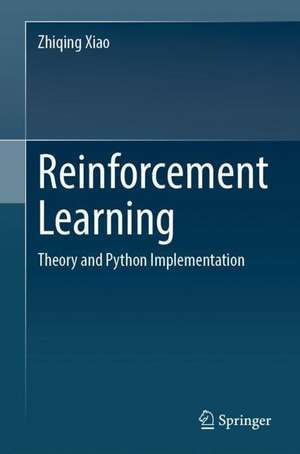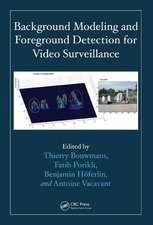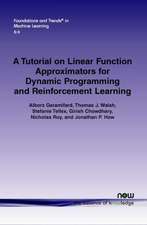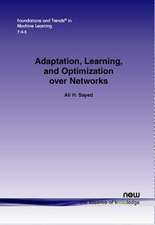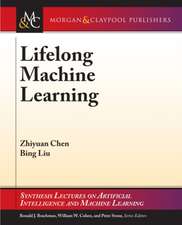Reinforcement Learning: Theory and Python Implementation
Autor Zhiqing Xiaoen Limba Engleză Hardback – 3 dec 2024
This book is intended for readers who want to learn reinforcement learning systematically and applyreinforcement learning to practical applications. It is also ideal to academical researchers who seek theoretical foundation or algorithm enhancement in their cutting-edge AI research.
Preț: 525.57 lei
Preț vechi: 656.95 lei
-20% Nou
Puncte Express: 788
Preț estimativ în valută:
100.57€ • 104.100$ • 83.23£
100.57€ • 104.100$ • 83.23£
Carte tipărită la comandă
Livrare economică 04-18 aprilie
Preluare comenzi: 021 569.72.76
Specificații
ISBN-13: 9789811949326
ISBN-10: 9811949328
Ilustrații: XLII, 593 p. 61 illus., 60 illus. in color.
Dimensiuni: 155 x 235 mm
Greutate: 1.03 kg
Ediția:2024
Editura: Springer Nature Singapore
Colecția Springer
Locul publicării:Singapore, Singapore
ISBN-10: 9811949328
Ilustrații: XLII, 593 p. 61 illus., 60 illus. in color.
Dimensiuni: 155 x 235 mm
Greutate: 1.03 kg
Ediția:2024
Editura: Springer Nature Singapore
Colecția Springer
Locul publicării:Singapore, Singapore
Cuprins
1 Introduction of Reinforcement Learning (RL).- 2 MDP: Markov Decision Process.- 3 Model-based Numerical Iteration.- 4 MC: Monte Carlo Learning.- 5 TD: Temporal Difference Learning.- 6 Function Approximation.- 7 PG: Policy Gradient.- 8 AC: Actor–Critic.- 9 DPG: Deterministic Policy Gradient.- 10 Maximum-Entropy RL.- 11 Policy-Based Gradient-Free Algorithms.- 12 Distributional RL .- 13 Minimize Regret.- 14 Tree Search.- 15 IL: Imitation Learning.- 16 More Agent–Environment Interfaces.
Notă biografică
Zhiqing Xiao obtained doctoral degree from Tsinghua University in 2016 and has more than 15 years in academic research and industrial practices on data-analytics and AI. He is the author of two AI bestsellers in Chinese: “Reinforcement Learning” and “Application of Neural Network and PyTorch” and published many academic papers. He also contributed to recent versions of the open-source software Gym.
Textul de pe ultima copertă
Reinforcement Learning: Theory and Python Implementation is a tutorial book on reinforcement learning, with explanations of both theory and applications. Starting from a uniform mathematical framework, this book derives the theory of modern reinforcement learning in a systematic way and introduces all mainstream reinforcement learning algorithms including both classical reinforcement learning algorithms such as eligibility trace and deep reinforcement learning algorithms such as PPO, SAC, and MuZero. Every chapter is accompanied by high-quality implementations based on the latest version of Python packages such as Gym, and the implementations of deep reinforcement learning algorithms are all with both TensorFlow 2 and PyTorch 1. All codes can be found on GitHub along with their results and are runnable on a conventional laptop with either Windows, macOS, or Linux.
This book is intended for readers who want to learn reinforcement learning systematically and apply reinforcement learning to practical applications. It is also ideal to academical researchers who seek theoretical foundation or algorithm enhancement in their cutting-edge AI research.
This book is intended for readers who want to learn reinforcement learning systematically and apply reinforcement learning to practical applications. It is also ideal to academical researchers who seek theoretical foundation or algorithm enhancement in their cutting-edge AI research.
Caracteristici
Introduces readers not only to algorithms, but also the mathematical theory behind them Covers all major reinforcement learning algorithms, including classical algorithms Every chapter is followed by high-quality implementations based on Python 3, Gym, and TensorFlow 2
